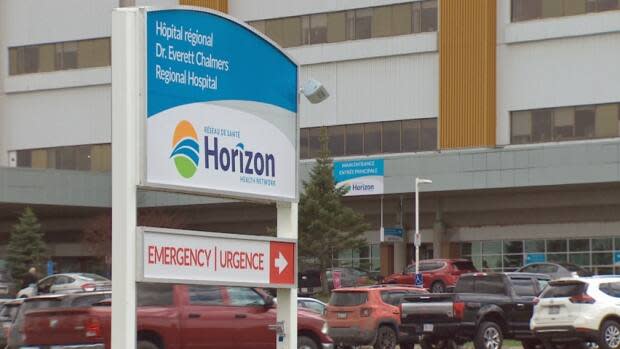New Brunswick ER nurse worries every day a patient will die waiting for care

A New Brunswick emergency room nurse says she worries every day that a patient will die waiting for care, as a young mother in Amherst, N.S., did two weeks ago.
"I'm afraid that can happen any day, any shift," said Catherine Little, a registered nurse at the Saint John Regional Hospital's ER for 20 years and the unit representative for all hospital nurses in the province.
She was commenting on the case of Allison Holthoff, 37, who died Dec. 31 after she waited more than six hours to see a doctor at the Cumberland Regional Health Care Centre ER while she experienced excruciating pain in her abdomen.
Holthoff went into cardiac arrest before an X-ray could be performed, according to her husband, Gunter Holthoff. She was resuscitated three times and later died in the intensive care unit.
"You know, things like that have … happened in New Brunswick already," said Little. She cited as an example the death of a man described by a witness as a senior in a wheelchair in the waiting room of the Dr. Everett Chalmers Regional Hospital's emergency department in Fredericton last July — one of at least four recent ER deaths.
Little fears the problems will only get worse unless the government deals with some of the root causes, including the need for more family doctors or better access to primary care, and more long-term care beds.
The Department of Health did not respond to a request for comment.
'Conditions are bad'
Little said she has seen "huge" changes in the past six weeks. "The conditions are bad," she said.
"Right now I'm stressed going to work, wondering what I'm going to walk into and if I have the necessary tools and places to see people that I need."
Nurses are triaging a lot of patients, waiting rooms are packed, and there are few beds for true emergencies, she said. That's because there's a backlog in admitting patients from the ER since many hospital beds are occupied by people waiting for long-term care beds.

ER wait times are long, she said. Even those who are "critically ill" can wait two to three hours.
People who are considered emergencies but not urgent wait about eight to 10 hours, while those who are non-acute could wait 10 to 12 hours.
"But you would be safe to wait with those things," she said, based on the Canadian triage and acuity scale.
Due to overcrowding, when an urgent case does come in, nurses sometimes have to put another patient in a hallway or storage room, with no medical equipment, said Little.
One nurse might be alone covering nine patients and might not get a break during a 12-hour shift, she said.
Nurses stressed, leaving
"Stress levels are high," said Little.
"When we see people in pain and waiting, especially the elderly, you know, it's just causing so much stress and burnout because we worry about what is going to happen."
She has noticed a "significant change" in staff in the past three weeks, she said — a lot of "emotional trauma." Some nurses "can't do it anymore."
The expectations are "too much," said Little. "We are continuously asked to do more with less and that is ongoing."
Many nurses are leaving to become travel nurses, leaving to find work in the private sector or leaving the profession altogether, she said.
Little admits she has also considered leaving, but wants to try to stay "until we can see positive changes."
Changes in primary care, long-term care needed
She contends the government needs to make some "big decisions" about how health-care services are delivered.
"I think that the province, all provinces in the Atlantic area, are falling short on providing sustainable health care."
Patients are "forced" to go to emergency departments for non-emergencies, she said, either because they don't have a primary care giver, such as a family doctor, or they face delays accessing them.
In addition, Little said, there aren't enough long-term are beds.
"So it is quite a circle," she said.
"So if we could make some changes in how care is delivered, I think that would have some impact on the people coming to the emergency department and the overcrowding."
Last month, Health Minister Bruce Fitch told reporters his department and the regional health authorities are doing "many, many things" to help alleviate some of the pressures in emergency rooms, such as recruitment, improvements to patient flow, and trying to make sure beds are open. He did not provide any specifics.
Positive changes in monitoring waiting rooms
Little noted the death of the man waiting for care in the Fredericton ER last summer did prompt a positive change in how often patients are monitored.
Horizon launched a pilot project, bringing in what it described as patient service workers to monitor the health status of people in the waiting rooms of its five biggest ERs, in Fredericton, Saint John, Moncton, Miramichi and Waterville, 24 hours a day, seven days a week.
"Every hour we have someone circulating in the waiting room to check on people, … to make sure that they're OK," said Little.

"Everybody is seen every hour and everybody is revitalled, based on their triage level," she said.
If a patient was medicated for pain during their initial triage, the monitor would ask how their pain level has changed. The monitor might also offer to help people go to the bathroom, get them a glass of water or a blanket.
It has helped improve care, according to Little. "We can identify when changes are happening a little bit sooner rather than later in patients' conditions."
Patients also appreciate the change, she said. "They feel like they're not being ignored in the waiting room."
Recent ER deaths
Among the other recent New Brunswick ER deaths, a patient at the Edmundston Regional Hospital's emergency department "lost their life under unforeseeable and exceptional circumstances" in July, the Vitalité Health Network said earlier.
A father of five died at the Moncton Hospital in November, when the ER was in a "critical overcapacity state," the Horizon Health Network said at the time.
And a man in his 70s died in the waiting room of the Edmundston Regional Hospital's emergency department last month, when the ER had a "high level of traffic and long wait times," Vitalité said.
Several New Brunswick hospitals had higher incidents of death in their emergency rooms between January and August 2022 than average, according to mortality data released by the two regional health authorities in December.
No causes of death were provided.
In the wake of the Fredericton patient's death, Premier Blaine Higgs appointed Fitch as the new health minister, replacing Dorothy Shephard, fired Horizon CEO Dr. John Dornan, and replaced the boards of both health authorities with trustees.


